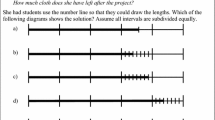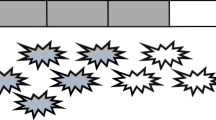Abstract
This study was undertaken in order to better understand prospective elementary school teachers’ motivations for working with fractions before and after taking a course designed to deepen their understanding of mathematics, as well as what instructional practices might be related to any changes detected in their motivations. Eighty-five education students were given a motivation questionnaire at the beginning and end of the semester, and observations were made of the 9 days when fractions were taught. Three levels of teacher data were collected to understand instructional practices. Students’ ratings of the importance and usefulness of fractions (value), self-concept of ability, and anxiety were near the center of the scale at pre-test, with only value in the desired direction. At posttest, value and self-concept of ability increased while anxiety decreased, but these changes differed somewhat by instructor. In particular, reform-oriented practices, such as engaging students in high-level discourse, seemed to be associated with lowered anxiety.

Similar content being viewed by others
References
Alexander, P. A. (1997). Mapping the multidimensional nature of domain learning: The interplay of cognitive, motivational, and strategic forces. In M. L. Maehr & P. R. Pintrich (Eds.), Advances in motivation and achievement (Vol. 10, pp. 213–250). Greenwich, CT: JAI Press.
Alexander, P. A., & Murphy, P. K. (1998). The research base for APA’s learner-centered psychological principles. In N. M. Lambert & B. L. McCombs (Eds.), Issues in school reform: A sampler of psychological perspectives on learner-centered schools (pp. 25–60). Washington, DC: The American Psychological Association.
Alsup, J. (2005). A comparison of constructivist and traditional instruction in mathematics. Educational Research Quarterly, 28(4), 3–17.
Anderman, E. M., Eccles, J. S., Yoon, K. S., Roeser, R., Wigfield, A., & Blumenfeld, P. (2001). Learning to value mathematics and reading: Relations to mastery and performance-oriented instructional practices. Contemporary Educational Psychology, 26, 76–95.
Ball, D. (1990). The mathematical understandings that prospective teachers bring to teacher education. The Elementary School Journal, 90(4), 449–466.
Beckmann, S. (2005a). Activities manual to accompany mathematics for elementary teachers. Boston: Pearson Education.
Beckmann, S. (2005b). Mathematics for elementary teachers. Boston: Pearson Education.
Bruner, J. (1977). The process of education. Cambridge, MA: Harvard University Press (Original published in 1960).
Bulgar, S. (2003). Children’s sense-making of division of fractions. Journal of Mathematical Behavior, 22, 319–334.
Case, R. (1988). Summary comments: Developing a research agenda for mathematics in the middle grades. In J. Hiebert & M. Behr (Eds.), Number concepts and operations in the middle grades (pp. 265–270). Hillsdale, NJ: Erlbaum.
Chambliss, M., & Graeber, A. (2003, April). Does subject matter matter? In Paper presented at the annual meeting of the American Educational Research Association, Chicago, IL.
Conference Board of the Mathematical Sciences. (2001). The mathematical education of teachers: Vol. II. Issues in mathematics education. Providence, RI: American Mathematical Society.
Eccles, J., Wigfield, A., Midgley, C., Reuman, D., MacIver, D., & Feldlaufer, H. (1993). Negative effects of traditional middle schools on students’ motivation. The Elementary School Journal, 93, 553–573.
Hembree, R. (1990). The nature, effects, and relief of mathematics anxiety. Journal for Research in Mathematics Education, 21(1), 33–46.
Hiebert, J., & Lefevre, P. (1986). Conceptual and procedural knowledge in mathematics: An introductory analysis. In J. Hiebert (Ed.), Conceptual and procedural knowledge: The case of mathematics (pp. 3–22). Hillsdale, NJ: Erlbaum.
Kilpatrick, J., Swafford, J., & Findell, B. (Eds.). (2001). Adding it up: Helping children learn mathematics. Washington, DC: National Academy Press.
Ma, L. (1999). Knowing and teaching elementary mathematics: Teachers’ understandings of fundamental mathematics in China and the United States. Mahwah, NJ: Erlbaum.
Mack, N. (1990). Learning fractions with understanding: Building on informal knowledge. Journal for Research in Mathematics Education, 21, 16–32.
Mack, N. (2000). Long-term effects of building on informal knowledge in a complex content domain: The case of multiplication of fractions. Journal of Mathematical Behavior, 19, 307–332.
Morris, A. (1995). Meaningful instruction in fractions: Implementing a theory in a low-achieving mathematics classroom. Focus on Learning Problems in Mathematics, 17, 16–40.
Newton, K. J. (2008). An extensive analysis of preservice elementary teachers’ knowledge of fractions. American Educational Research Journal, 45(4), 1080–1110.
Olejnik, S., & Lee, J. (1990, April). Multiple comparison procedures when population variances differ. In Paper presented the annual meeting of the American Educational Research Association, Boston, MA.
Rasmussen, J. L. (1989). Analysis of likert-scale data: A reinterpretation of Gregoire and Driver. Psychological Bulletin, 105(1), 167–170.
Rittle-Johnson, B., Siegler, R., & Alibali, M. W. (2001). Developing conceptual understanding and procedural skill: An iterative process. Journal of Educational Psychology, 93(2), 345–362.
Seaman, C. E., & Szydlik, J. E. (2007). Mathematical sophistication among preservice elementary teachers. Journal of Mathematics Teacher Education, 10, 167–182.
Skemp, R. R. (1978). Relational understanding and instrumental understanding. Arithmetic Teacher, 26, 9–15.
Smith, J. P. (1995). Competent reasoning with rational numbers. Cognition and Instruction, 13, 3–50.
Stipek, D. (2002). Good instruction is motivating. In A. Wigfield & J. S. Eccles (Eds.), The development of achievement motivation (pp. 310–334). New York: Academic Press.
Suinn, R. M., Edie, C. A., Nicoletti, J., & Spinelli, P. R. (1972). The MARS, a measure of mathematical anxiety: Psychometric data. Journal of Clinical Psychology, 28, 373–375.
Swars, S. L., Daane, C. J., & Giesen, J. (2006). Mathematics anxiety and mathematics teacher efficacy: What is the relationship in elementary preservice teachers? School Science and Mathematics, 106(7), 306–315.
Tirosh, D. (2000). Enhancing prospective teachers’ knowledge of children’s conceptions: The case of division of fractions. Journal for Research in Mathematics Education, 31, 5–25.
Trice, A. D., & Ogden, E. D. (1986). Correlates of mathematics anxiety in first-year elementary school teachers. Educational Research Quarterly, 11(3), 2–4.
Turner, J. C., Meyer, D. K., Midgley, C., & Patrick, H. (2003). Teacher discourse and sixth graders’ reported affect and achievement behaviors in two high-mastery/high performance mathematics classrooms. The Elementary School Journal, 103(4), 357–382.
Tzur, R. (2004). Teacher and students’ joint production of a reversible fraction conception. Journal of Mathematical Behavior, 23, 93–114.
Usiskin, Z. P. (2007). The future of fractions. Arithmetic Teacher, 12(7), 366–369.
Valli, L., & Croninger, R. (2002). High quality teaching of foundational skills in mathematics and reading (#0115398). Washington, DC: National Science Foundation Interdisciplinary Educational Research Initiative.
Vinson, B. M. (2001). A comparison of preservice teachers’ mathematics anxiety before and after a methods class emphasizing manipulatives. Early Childhood Education, 29(2), 89–94.
Widmer, C. C., & Chavez, A. (1982). Math anxiety and elementary school teachers. Education, 102, 272–276.
Wigfield, A., & Eccles, J. S. (2000). Expectancy-value theory of achievement motivation. Contemporary Educational Psychology, 25, 68–81.
Wigfield, A., & Meece, J. (1988). Math anxiety in elementary and secondary school students. Journal of Educational Psychology, 80(2), 210–216.
Acknowledgments
I would like to thank James Byrnes, Jacqueline Leonard, Julianne Turner, and several anonymous reviewers for their very thoughtful comments on earlier versions of this manuscript.
Author information
Authors and Affiliations
Corresponding author
Appendices
Appendix A
Motivation questionnaire


Appendix B
Attribution scales
Knowledge |
Promotes principled understanding in students |
Activates and builds on students’ knowledge and experiences |
Manifests a deep and accurate understanding of the lesson |
Illustrates the value or utility of the lesson content |
Strategic processing |
Explicitly teaches general or domain-specific strategies |
Models general or domain-specific strategies |
Encourages students to be reflective and self-regulatory |
Provides opportunities for engagement in reasoning or non-routine problem-solving |
Development and individual differences |
Demonstrates understanding of developmental levels in lesson content and delivery |
Maintains high, but reasonable, expectations for all students |
Is cognizant of students’ individual strengths and needs |
Plans for and adjusts to variations in students’ thinking, behavior, or background |
Motivation |
Incorporates student interest or choice in the lesson |
Manifests an interest or excitement in the content |
Involves all students actively in the lesson |
Promotes positive attributional and self-competency beliefs among all students |
Context and situation |
Creates a caring and affirming learning environment |
Makes effective use of available resources in planning and promotes their use |
Uses a variety of social interaction patterns during the lesson |
Welcomes and engages all students’ thoughts and reactions |
Rights and permissions
About this article
Cite this article
Newton, K.J. Instructional practices related to prospective elementary school teachers’ motivation for fractions. J Math Teacher Educ 12, 89–109 (2009). https://doi.org/10.1007/s10857-009-9098-z
Received:
Accepted:
Published:
Issue Date:
DOI: https://doi.org/10.1007/s10857-009-9098-z




